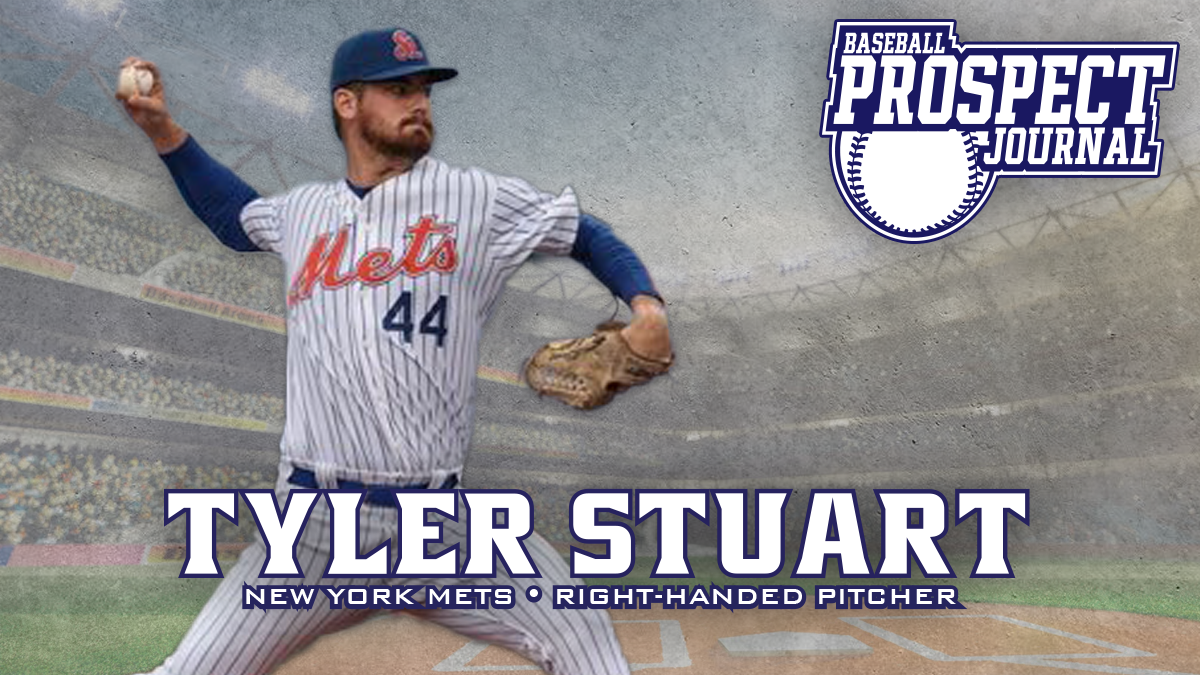BROOKLYN, N.Y. – Sometimes a player can make a simple tweak or adjustment that potentially changes the course of their career. Tyler Stuart, a pitching prospect for the New York Mets, reached that turning point when he learned to throw a slider as another pitch to compliment his fastball and changeup.
Stuart improved his slider during the offseason, and by the time the regular season began, he was a pitcher driven to succeed. His 1.44 ERA at the end of June was the lowest in Minor League Baseball.
“I just knew this offseason, going into professional baseball, that I needed an outpitch,” Stuart said. “I was very fastball-heavy in college and didn’t really have something consistent that was my go-to pitch, as opposed to other guys I watched. Now, I found something that I can throw in any count and have confidence.
“After watching a lot of videos on a bunch of other guys that have very similar profiles to me, I saw that they attack with a lot of sliders and have tremendous success with it on the mound. So, that is the route that I took, and my spin rate has gone up as well since college.”
The consistency turned to dominance. Stuart allowed one run or less in 10 of his first 12 starts with advanced Class A Brooklyn. Opposing batters hit .208 against him, struggling to adjust their timing at the plate due to the spin and movement of his slider.
Stuart also lasted deeper in games, pitching into the seventh inning three times over his last six starts. His strikeout rate increased to 11.2 hitters per nine innings with an improved pitch mix and stamina.
“I put a lot of work into the success that I had this early on this year,” Stuart said. “It is a craft that I am trying to better at every single day, but as a whole, I’m pretty happy with where I am at on the mound. I think that it has been good getting used to the hitters at this level and facing similar hitters week to week. We have a pretty good idea of who is stepping in the box and the tendencies they have. It helps getting in that prep before every start.”
“This is my first experience with (Stuart) coming into the season, and guys who prepare the right way every day, crave success and deserve success,” Brooklyn Cyclones manager Chris Newell said. “He is a total pro in his first full season that goes about things the right way, so being around him and knowing how he’s wired, I am not surprised at all by his recent success.”
No start exemplified Stuart’s breakout more than the one on June 22 against the Hudson Valley Renegades. He allowed one run on four hits and struck out 11 in 7 2/3 innings of work. Stuart kept hitters off stride late in counts, working his slider to both sides of the plate and keeping the fastball up in the zone.
He became the first Cyclones pitcher to pitch at least eight innings in a game with 10 strikeouts since Kevin Canelon in August 2015.
“When you are a hitter in the box, you cannot eliminate pitches from his arsenal because he capable of throwing all three pitches for strikes,” Newell said. “He is dominant on the mound. It is a testament to his work ethic and his commitment to excellence. You guys are witnessing something pretty special and it is only going to get better. I know every time I look down and see that it is his day to start that he is going to give us a chance to win.”
One reason hitters have a difficult time squaring up Stuart is his size. At 6-foot-9 and 250 pounds, Stuart is one of the tallest pitchers in professional baseball and sometimes appears to stand on top of hitters in the batter’s box as he releases a pitch. Unlike many pitchers of his stature who struggle with their command due to a longer release path, Stuart does a better job of repeating his delivery and attacking the strike zone.
“I have a lower arm slot for my height, so I don’t think that is too different,” Stuart said. “But from the extension side of things, I get down on my arm a little bit more, which gets on a hitter a little bit faster. Just having that few extra inches of extension makes a difference.”
Along with leading the minor leagues in ERA, Stuart has the highest strand rate in the South Atlantic League at 89.5%. Part of the reason he has had a high success rate of escaping potential jams is his ability to reach the plate quicker while pitching out of the stretch and getting late movement down in the strike zone with his slider and fastball. He also shows confidence in those situations by focusing on the hitter at the plate.
“I am more comfortable with runners on base, as opposed to in the past because I would press a little bit more because I did not want the run to score, but now I just act like the runners are not really there,” Stuart said. “I can pick off runners and control the running game, that aspect, but I don’t put extra pressure on myself when there are runners on base.”
Many pitchers in today’s game use technology to hone their pitches on the mound. Stuart uses those tools to study the spin rate and break of his pitches and looks for ways to build off past starts for future growth.
Having the information at a pitcher’s disposal helps him further his development by becoming self-aware of areas of improvement and providing additional resources to utilize.
“I use a lot of technology every time I touch the mound to see the late break on my slider, how much break I’m getting and the different pressure points on the ball to get to where I am now,” Stuart said.
“In college, I was throwing a four-seam fastball instead of a two-seam fastball, and without having that technology, I would still be throwing the four-seam. The two-seam is a lot more natural coming out of my hand. I think technology has helped me tremendously as a pitcher.”
While at Southern Miss, Stuart only pitched out of the bullpen after recovering from Tommy John surgery as a redshirted freshman. He returned in 2022 and went 4-0 with a 3.38 ERA in 22 appearances before the Mets selected him in the sixth round of the MLB draft.
Stuart is now the 18th-best prospect in the Mets’ minor league system, according to Baseball America. He is a prime example of the organization’s success in recently turning college relief pitchers into top-tier starting pitching prospects.
Like his former teammate Christian Scott, Stuart flourished as a starter in Brooklyn this season and made significant strides by adding a new pitch and improving his command. Stuart’s ascent now puts him among the top pitching prospects in the Mets’ system, which is a credit to the effort put in by scouting and player development.
“We’ve got very smart, talented scouts and guys who go the extra mile to take pride in their work. We get to be the beneficiary of their hard work as the player development staff,” Newell said. “We try to make these guys into big leaguers. (Stuart) has taken full advantage of the opportunity, and I could not be any happier for him.”


